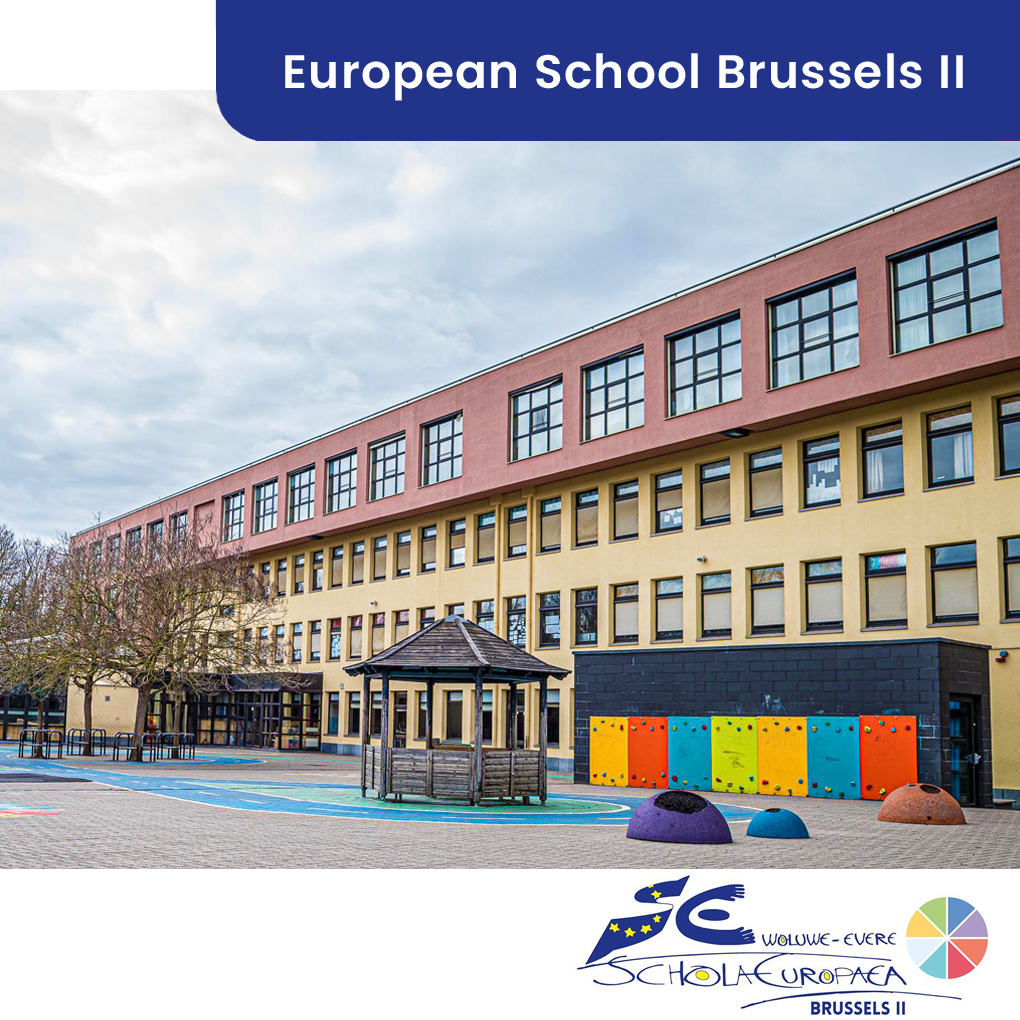
European school in Brussels
European School Brussels II – Woluwe & Evere
The European School Brussels II (EEB2) operates across two campuses: Woluwe and Evere. Founded in 1974, it offers high-quality multilingual and multicultural education, primarily targeting children of European institution staff.
EEB2 hosts approximately 3,824 students from 65 nationalities, supported by 287 teachers, maintaining a teacher-student ratio of 1:12, ensuring individualized and quality teaching.
3824
STUDENTS
65
NATIONALITIES
287
TEACHERS
Educational programme of European school Brussels II – Woluwe & Evere
Academic Curriculum
> Ages 4 to 18
European School Brussels II provides a structured curriculum divided into three cycles:
- Nursery School (ages 4-5) – Woluwe & Evere campuses
- Objective: Development of personality, learning abilities, and respect for others.
- Primary School (ages 6-10) – Woluwe & Evere campuses
- Objective: Acquisition of foundational language and scientific skills, emphasizing mother tongue, mathematics, and a first foreign language.
- Secondary School (ages 11-18) – Woluwe campus
- Objective: Enhanced proficiency in languages, sciences, and humanities, with elective options such as economics or a third foreign language.
Upon completion of the seventh secondary year, students earn the European Baccalaureate, recognized throughout the EU and beyond, paving the way to top universities and international careers.
9 language sections
+ additional languages taught
European School Brussels II strongly promotes cultural and linguistic diversity, fostering openness and international cooperation.
- Woluwe Campus: 9 language sections
🇬🇧 English | 🇫🇷 French | 🇫🇮 Finnish | 🇩🇪 German | 🇮🇹 Italian | 🇱🇹 Lithuanian (up to S6) | 🇳🇱 Dutch | 🇵🇹 Portuguese | 🇸🇪 Swedish - Evere Campus: 4 language sections
🇫🇷 French (Nursery to P5) | 🇬🇧 English (Nursery to P4) | 🇩🇪 German (Nursery to P4) | 🇮🇹 Italian (Nursery to P3)
This linguistic diversity allows students to grow in a unique multicultural environment while maintaining strong connections to their original languages and cultures.
Parents’ Association (APEEE)
An active and supportive community
European School Brussels II benefits from active support by the Parents’ Association (APEEE), an independent association managed by volunteer parents.
The APEEE represents parents before the school, addressing key topics such as education, administration, and student welfare. It ensures continuous communication with families through elected representatives.
APEEE Services manages essential services on the Woluwe and Evere campuses, including:
- Canteen – Catering services tailored to students’ needs.
- School transport – An organized bus network ensuring safe journeys.
- Extracurricular activities – A wide range of educational and sports activities.
Admission Requirements | European School Brussels II – Woluwe & Evere
Admission to European Schools is based on a category system (I, II, and III), defining admission priorities and fees. Students not falling into any category cannot be enrolled.
Category I: Priority and Free Admission
Children of employees of EU institutions and affiliated organizations (European Commission, European Parliament, EIB, etc.) have guaranteed spots and exemption from tuition fees.
This includes:
- EU institution officials and contract agents
- National experts seconded to institutions
- European School teachers and staff
- Staff of the EIF Secretariat and other approved bodies
Category II: Admission under Special Agreements
Students in this category are admitted based on specific agreements between European Schools and certain organizations or companies. These agreements specify rights and financial contributions towards tuition fees.
Category III: Admission Subject to Availability
Students not falling into Categories I or II. Admission depends on available places and requires tuition fees set by the Board of Governors of the European Schools.
Priority for Category III:
- Children of diplomats and national officials stationed in Brussels.
- Children of diplomatic personnel returning to their home country where integration is difficult.
- Children of staff from non-EU permanent representations.
- Children of diplomatic status staff based in Brussels and Luxembourg.
- Children from families whose mother tongue or previous instruction language doesn’t match national education languages.
